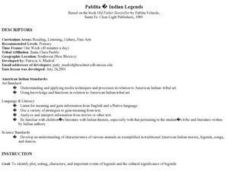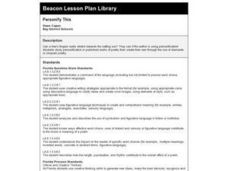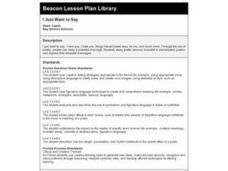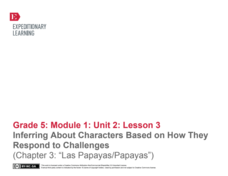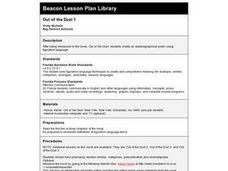Curated OER
"In a Grove" and "Rashomon" by Akutagawa
Students read and analyze the short stories, "In a Grove," and "Rashomon," by Akutagawa. They discuss the samurai warrior culture, watch a short video, take a quiz, participate in whole-group discussions, identify similes and metaphors,...
Curated OER
Julie of the Wolves
Have your class practice their comprehension skills using this resource. After reading Julie of the Wolves by Jean Craighead George, learners engage in cause and effect activities, identify story elements and figurative language, and...
Curated OER
Pablita Indian Legends
Scholars are introduced to the characteristics of a legend. They read and discuss Old Father Story Teller by Pablita Velarde. Then, in groups, they write and illustrate a poem based on one of the legends from the book. This lesson plan...
Curated OER
A Moment in Time
Eighth graders study poems to see how punctuation, line length, rhythm and word choice can be used to create a memorable moment. They read and discuss poems by Shel Silverstein.
Curated OER
Personify This
Eighth graders study personification in published works of poetry, then create their own through the use of diamante or cinquain poetry. They read and discuss poetry by Shel Silverstein, William Jay Smith, and Elinor Wylie.
Curated OER
I Just Want to Say
Eighth graders study poetic devices included in conversation poems and explore their eloquent messages. They read and discuss poems by Langston Hughes and Don Marquis.
Curated OER
I'm A Poet and Now I Know It
Eighth graders gather ideas generated from other poems and their own inspiration, to create original poetry. A celebration is included as students bind and submit poems for publication.
Curated OER
A Christmas Carol - Charles Dickens
Students study and explore the portrayal and development of a major character in a novel from the novel, "A Christmas Carol," by Charles Dickens. They identify words and phrases that effectively describe the main character in this novel....
Curated OER
Night of the Twisters Figurative Language
For this reading worksheet, students read and learn about writers' use of figurative language to create vivid pictures with words. Students are directed to specific pages in The Night of the Twisters by Ivy Ruckman and answer 20...
Curated OER
Unforgettable...
Middle and high schoolers remember their most memorable experiences, and then connect their own narrative with an exposition about the topic associated with their experience. This New York Times instructional activity would be a great...
Teachers.net
Figurative Language
When is a staple remover a fanged monster? In your ELA classroom when you're teaching this fun figurative language lesson, of course! Get your young writers using figurative language by making a game of it. Give groups a paper bag full...
Curated OER
Figurative and literal language through the study of Shakespeare
Sixth graders explore figurative and literal language. They study literary devices through short pieces of Shakespeare's work. Then investigate Shakespeare's works and life.
Curated OER
Writing a Personal Letter Using the Short Story "Eleven"
Challenge your class to connect to the text of "Eleven" by Sandra Cisneros with this activity, which prompts them to write a personal letter from the main character's point of view. The story, prompt, and letter template are all included...
Curated OER
The Language of Surprise
Aspiring writers complete and discuss fill-in-the-blank cliché expressions, define cliché as a form of predictable writing, take cliché expressions and turn them into new, unpredictable ones, read poetry that illustrates writer's use of...
Roald Dahl
The Twits - Dirty Beards
The problem with beards is that they collect a lot of food. The first activity in an 11-part unit related to The Twits by Roald Dahl explores the hairy jungle that is Mr. Twit's beard. A concluding project has learners create their own...
Gwinnett County Public Schools
Analysis of the Tuck Everlasting and The Birchbark House Text Exemplars
Looking to introduce some text-based questions into your ELA lessons? Practice the kinds of skills the Common Core demands with the seven text-based questions and the essay prompt provided here. Designed to be a three-day lesson, day one...
EngageNY
Building Background Knowledge: Learning About the Historical and Geographical Setting of Esperanza Rising (Chapter 1: “Aguascalientes, Mexico, 1924”)
Set up your class to read Esperanza Rising, by Pam Muñoz Ryan, through a class read-aloud and exploration of the setting. The detailed instructional activity outlines each step. First, class members read over the first few pages and...
EngageNY
Getting to Know Esperanza (Chapter 2: “Las Uvas/Grapes”)
Delve into Esperanza Rising by Pam Muñoz Ryan with close reading and evidence-based, text-dependent questions. Part of a unit series, this well-sequenced, Common Core designed instructional activity draws on material from the previous...
EngageNY
Inferring About Characters Based on How They Respond to Challenges (Chapter 4: "Los Higos/Figs")
How do you know what a character's personality is like if an author doesn't tell you? With a focus on character development in Esperanza Rising, pupils complete a jigsaw activity to analyze the actions of Mama, Abuelita, and Miguel. Once...
EngageNY
Inferring About Characters Based on How They Respond to Challenges (Chapter 3: "Las Papayas/Papayas")
Start off your day with a quick reading comprehension quiz about chapter three of Esperanza Rising by Pam Muñoz Ryan. After they complete the quiz, pupils participate in a discussion and look closely at the text. A strong Common Core...
EngageNY
Gathering Evidence and Drafting a Two-Voice Poem (Chapter 13: "Los Duraznos/Peaches")
Begin class with a short comprehension quiz and review and then move into a new genre: two-voice poems. The activity provides information about this type of poetry as well as a video example made by eighth graders that you can show your...
Curated OER
Poetry Passport
Passport photos are notoriously unflattering but here's an activity that encourages youngsters to create a poetic picture of themselves using each category on the passport as a prompt for a poem.
Curated OER
Out of the Dust 1
Students review figurative languages terms and examples. They read the first entry in the book, Out of the Dust, and discuss the images created by the author. Then they create an autobiographical poem using figurative language.
Curated OER
Out of the Dust 4
Eighth graders read the novel, "Out of the Dust," and create a free-verse poem about a treasure of their own. They use the attached checklist to evaluate their own poem.
Other popular searches
- Metaphors and Similes
- Poetry Similes and Metaphors
- Similes Metaphors Powerpoint
- Metaphors and Similes Test
- Using Similes and Metaphors
- Autumn Metaphors and Similes
- Similes and Metaphors Poem
- Poetry Similes Metaphors
- Metaphors Similes
- Poems Similes and Metaphors
- Similes Metaphors Idioms
- Similes Metaphors Songs




